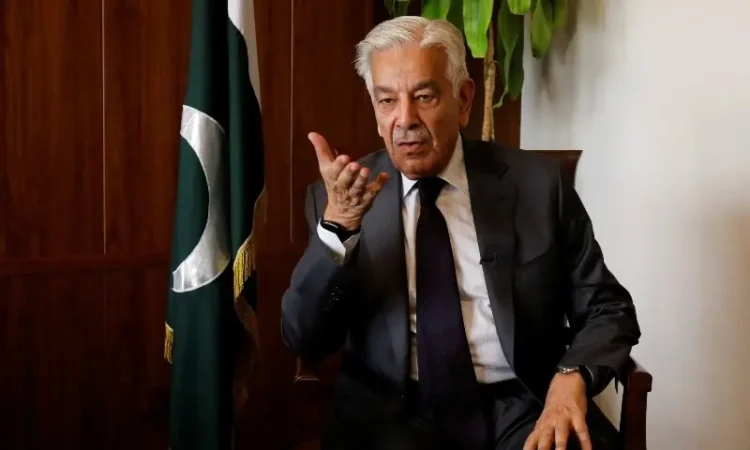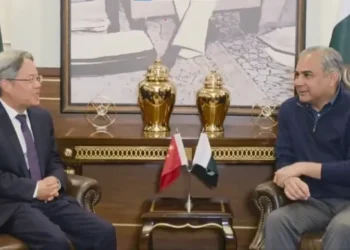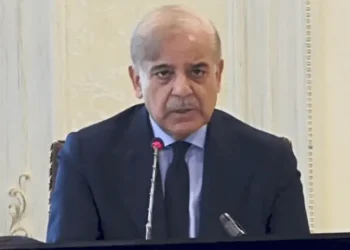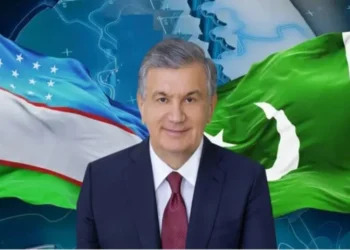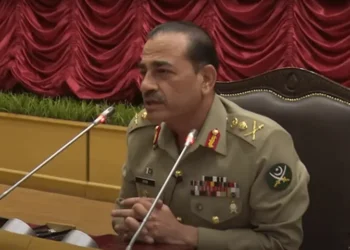Web Desk; Defence Minister Khawaja Asif said on Monday that the recently signed ceasefire agreement between Pakistan and Afghanistan depends entirely on the Afghan Taliban’s ability to control militants carrying out attacks inside Pakistan from Afghan territory.
The announcement came after a deadly week of border clashes that left dozens dead — the most intense fighting between the two countries since the Taliban took control of Kabul in 2021. The ceasefire was negotiated in Doha over the weekend following ground fighting and Pakistani airstrikes along the disputed 2,600-kilometre border.
“Anything coming from Afghanistan will be considered a violation of this agreement,” Asif said during a media interaction at his Parliament House office in Islamabad. “Everything depends on this one clause.”
The defence minister explained that the ceasefire was brokered by Qatar and Turkiye, whose representatives also signed the accord along with Pakistan and Afghanistan. “In the agreement, it has been clearly stated that there will be no cross-border incursions,” he said, adding that the truce would remain effective as long as both sides respected it.
Asif accused the banned Tehreek-i-Taliban Pakistan (TTP) of operating from Afghan soil with the support of the Taliban regime — a claim repeatedly denied by Kabul. He said the core objective of the Doha agreement was to eliminate terrorism that has long destabilized the Pakistan-Afghanistan border region.
“The two sides have realized that terrorism must be eradicated immediately,” Asif told Al Jazeera Arabic, adding that Qatar’s Emir Sheikh Tamim bin Hamad Al Thani and Turkish President Recep Tayyip Erdogan personally played key roles in facilitating the deal.
The minister said a follow-up meeting will be held in Istanbul next week (October 25) to finalize an implementation mechanism and address unresolved issues. “My Afghan counterpart also agreed that terrorism is the root cause of tension between our two nations,” he added.
Asif emphasized that Pakistan has paid a heavy price — both in human lives and economically — due to terrorism, but expressed hope that “peace will now return and bilateral relations will normalize.” Once stability is restored, he said, bilateral trade and transit activities would resume, allowing Afghanistan to again utilize Pakistani ports.
Regarding the Afghan refugees, Asif said those holding valid visas and documents will be allowed to stay, but the government will continue to repatriate undocumented migrants.
Addressing speculation about U.S. involvement in Pakistan’s recent airstrikes, Asif dismissed such reports as “baseless,” saying: “It is total nonsense. Pakistan has had enough of its past involvement in Afghan affairs. We want to live as peaceful neighbors and have no business in Afghanistan’s internal or external relations.”
In an interview with Geo News, Asif clarified that the Doha negotiations were cordial, crediting Qatari and Turkish officials for mediating all communication between the two sides. “There was no confrontation. All discussions, including amendments, were conducted through mediators,” he said.
He revealed that the draft agreement was only one page long, contrary to an alleged detailed version circulating online, and reiterated that final technical discussions would take place in Istanbul.
Regarding the truce’s durability, Asif said he maintained “guarded optimism”: “It’s too early to make a conclusive statement. We will see in the coming weeks how effectively this agreement is implemented.”
Asif added that if any violations occur, Qatar and Turkiye will again be asked to mediate, and confirmed that the TTP leadership currently resides in Afghanistan, a topic to be addressed in the next meeting.
When asked about the changes in Qatar’s press release—which omitted references to “border tensions” in a revised version—Asif said the issue was minor and unrelated to the formal agreement. “It has no bearing on the accord itself,” he stated.




















































